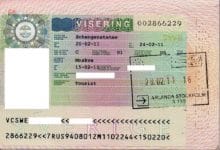EU Blue Card 2024
Applying For An EU Blue Card
The EU Blue Card Program is a work and residency permit designed to encourage working professionals to relocate to European Union countries.
It’s been likened to the US Green Card program. Read on to find out if you’re qualified for the card.
What Is EU Blue Card?
The EU Blue Card is a visa and residence permit that permits its bearer to work in the European Union Countries. The card is valid in 25 European Union nations. This program excludes Denmark and Ireland.
This program provides cardholders with access to social services such as healthcare, education, and travel. It is a meritocracy system. Either the candidate possesses the necessary abilities and qualifications, or he or she does not.
This card is issued by the following countries:
S/N |
List of Countries Issuing Blue Card |
| 1 | Austria |
| 2 | Belgium |
| 3 | Bulgaria |
| 4 | Croatia |
| 5 | Cyprus |
| 6 | Czech Republic |
| 7 | Estonia |
| 8 | Finland |
| 9 | France |
| 10 | Germany |
| 11 | Greece |
| 12 | Hungary |
| 13 | Italy |
| 14 | Latvia |
| 15 | Lithuania |
| 16 | Luxembourg |
| 17 | Malta |
| 18 | Netherlands |
| 19 | Poland |
| 20 | Portugal |
| 21 | Romania |
| 22 | Slovakia |
| 23 | Slovenia |
| 24 | Spain |
| 25 | Sweden |
Source: EU Blue Card Network
EU Blue Card Validity
If the contract is for more than one year but less than three years, the EU Blue Card is originally given for three years or the term of the individual’s work contract.
The card will be valid for the life of the contract plus an additional three months in this scenario. This period might be utilized to look for a new employment in the nation or to prolong a current contract. The card can be renewed once it expires.
Categories Of The EU Blue Card
The EU Blue card has 7 categories:
- Self-employed/entrepreneurs.
- Intra-corporate transfers
- Highly-qualified or skilled workers
- Researchers
- Vocational trainees
- Students
- Seasonal workers
Eligibility Criteria For An European Union Blue Card
The qualifying requirements differ depending on the category. However, there are a few conditions that must be met.
- The applicant must be a Non-EU citizenship
- Must have a Master’s Degree or professional qualifications of +3 years
- Posses work experience of over 5 years
- Show proof of a job offer or 1-year work contract for a position in an EU country
- The position should offer a salary at least 1.5 times the average gross annual salary threshold of the country
- Proof of necessary valid health insurance and travel documents
- The candidate must also fulfill the national legal criteria in the case of regulated professions.
Related: How A Non- EU Citizen Can Work In The UK
Applying For An EU Blue Card
The EU Blue Card can be applied for by an individual or the individual’s employer. The application process varies from among member countries.
Some European Union members allow applications online, while others need applicants to schedule an appointment with the Embassy or Consulate to submit their application and accompanying papers.
Member states can also impose a restriction on how many non-European Union citizens are allowed to enter using an EU Blue Card. Typically, it takes 90 days to process an application.
Documents Required To Apply
The documents required include:
- Two copies of the applicant’s completed and signed application form
- A passport that is valid for at least 15 months beyond the EU Blue Card’s intended validity period. There should be at least two blank pages in it.
- Photocopies of the passport’s initial page, as well as the pages containing visa stamps and stickers.
- Any prior passports that the person has held
- Two passport-sized color photos that fulfill ICAO requirements. The photographs should have been taken within the last 3 months.
- A copy of a legitimate employment offer or work contract from a company headquartered in the EU. All parties should have signed the offer, and it should be valid for at least a year.
- It must also state the compensation and demonstrate that it complies with the minimum wage standards.
- Proof of educational and professional credentials
- A copy of necessary certificates is also required for positions in regulated professions.
- The individual’s proof of health insurance
- Evidence of payment of the application fee. At the time of application, a fee of 140 Euros is due.
- An employer’s statement detailing the advantages received and the grounds for employment.
- Proof that the application does not constitute a health, public policy, or security concern to the state.
- A copy of the applicant’s most recent CV
Applying For Qualification Recognition
In regulated vocations such as law, medicine, engineering, education, and so on, the candidate must have a certificate or license that allows them to work in the area. The certification application must be submitted from the applicant’s native country.
Rights Of An EU Blue Card Holder
An EU Blue Card comes with a slew of benefits. This includes the following:
- Tourists have the freedom to travel throughout the European Union for up to 90 days in 180 days.
- Access to social rights such as health services, education, and human, cultural and economic rights
- The ability to bring your family along. This includes your spouse, registered partner, and minor children who are not married.
- The ability to go back to one’s home country or any other country outside the European Union for up to 12 consecutive months without losing ownership of the Card.
- Equal right to salary payable and work conditions as available to the member state’s citizens
- Eligibility for a permanent residence visa has improved.
Converting Blue Card Status to Permanent Residency
The Blue Card can also be viewed as a means of obtaining permanent residency. After 21 months in the country, the cardholder will be eligible for permanent residency if he or she has earned B1 language level certificates in the country’s native language. Otherwise, after 33 months in the nation, he or she is eligible for permanent residency. Any time spent outside the nation will not be counted toward a permanent residency application.
Work Permits Vs The EU Blue Card
The EU Blue Card isn’t the only option to operate lawfully in the European Union. Individuals can also apply for work permits in some countries. Between having a work permit and having a Blue Card, there are a few major distinctions.
A work permit restricts an individual’s employment to the nation that granted the permission, but Blue Card holders are eligible to work in any of the 25 European Union countries that accept the program. The eligibility requirements for the EU Blue Card differs from that of a work permit.
If a person simply wants a work permit, he or she does not require a Master’s Degree. A work permit does not entitle the holder to permanent status just because they have spent time in the nation. Finally, EU Blue Card holders have a better chance reuniting with their families via the family reunification path. Learn how to apply for Germany dependent visa.
FAQs On EU Blue Card
Do I need a Blue Card to work in the EU?
Non-EU nationals who wish to work in the EU require a work permit at all times.
You may not require a visa to enter the EU, but you will always require a work permit.
Citizens of the United States, Australia, Canada, Israel, Japan, and New Zealand do not require a visa to work in Germany.
Can I travel throughout Europe with my Blue Card?
You can use your EU Blue Card to travel across the Schengen region if it was not issued in Romania, Bulgaria, Cyprus, or Croatia. The Schengen zone encompasses the majority of Europe. The United Kingdom and Ireland are notable outliers.
Who issues the EU Blue Card?
The country’s immigration services, where the job and residence will be taken up.
Which citizens are excluded from EU Blue Card holdership?
European Economic Area (EEA) citizens (European Union, Norway, Liechtenstein, Iceland and Switzerland). Pitcairn Island, Montserrat, and Greenland are examples of overseas countries and territories (OCTs) with constitutional links to EU member states.
Am I Eligible for the EU Blue Card?
If you are a non-EU citizen who has completed higher education and/or has three years or more professional experience in the field linked to your profile, you are qualified.
In order not to miss out on prompt updates from careerinfos.com, enter your email address below and hit the subscribe button beneath.
A confirmation link will be sent to your inbox or check your spam mails if its not in your inbox. Make sure you click the link to confirm your subscription in order not to miss any updates from this blog. All comments (related to the post above) should be dropped via the comment section below.



